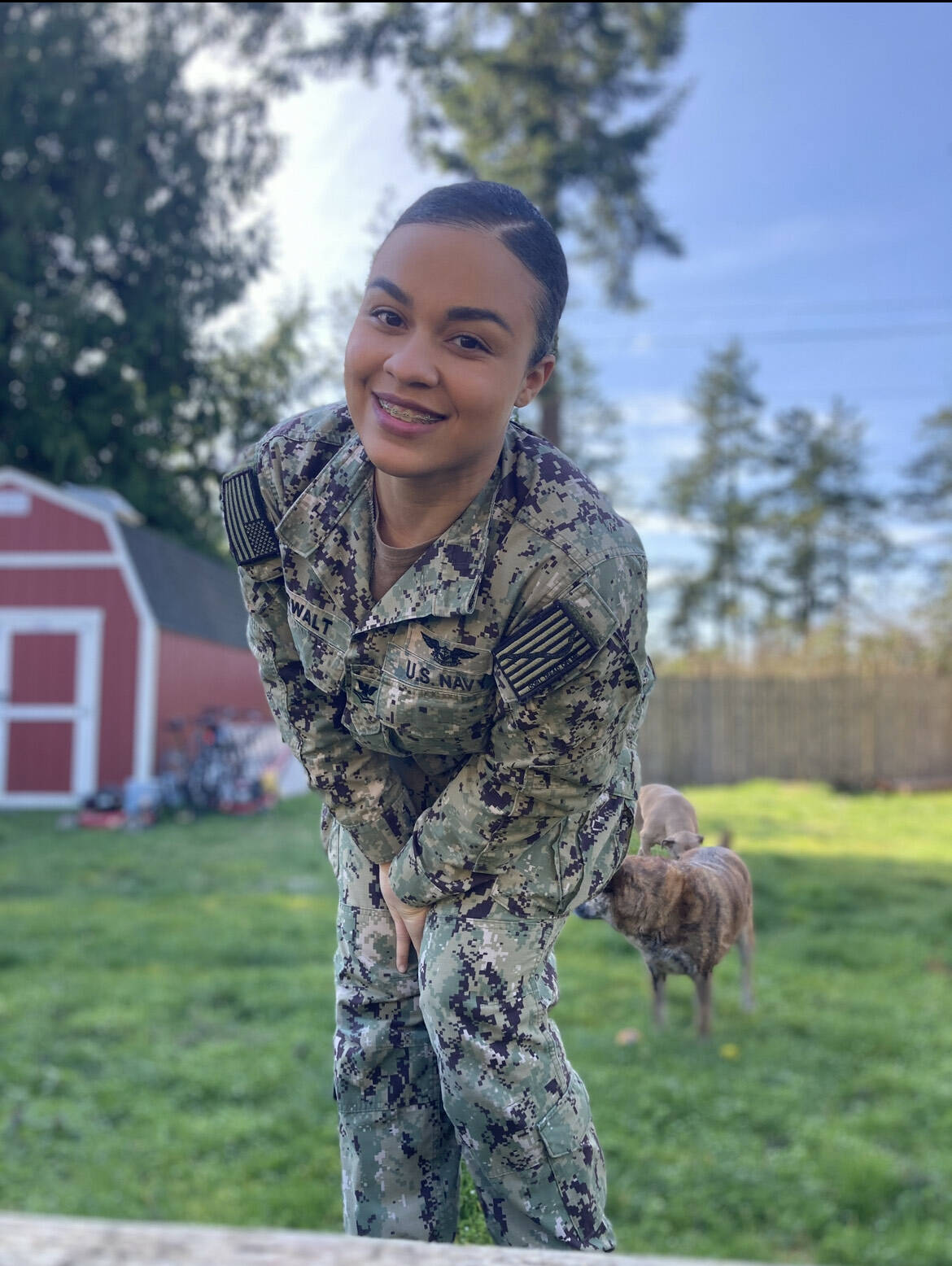An Oak Harbor-based Navy veteran is using her platform to promote mental health and wellness among military members and veterans.
Rachel Oswalt is the host of “Your Story Doesn’t End Here,” a podcast devoted to discussions around mental health and suicide awareness in the military community. Though in many episodes Oswalt brings on guests to share their stories, it was her own experience in the Navy that led her to become an advocate for improved mental health resources for military members and eventually expand her brand to include community events.
Oswalt grew up in Iowa, and her Navy career brought her to Whidbey Island. She joined in 2015 and served for six years as an aviation electronic technician. Her time in the military was marked by both extraordinary highs and painful lows, she shared in an interview, and her own mental health declined during her service.
Oswalt attributed her own and other service members’ mental health struggles to a number of factors. First, she said, she dealt with many people in positions of leadership who had not been properly trained in essential leadership skills such as active listening.
“A lot of people that I talk to don’t realize that, because the military is really regarded as one of the epitomes of leadership in the United States,” she said.
Second, Oswalt said the Navy doesn’t have sufficient mental health resources for its members. At the time Oswalt served, she said, there were social workers on base to assist with mental health issues, but few professionals with the expertise to diagnose conditions such as post-traumatic stress disorder.
The wait time to see a therapist was also excessive, Oswalt said. When her own mental wellness was suffering and she sought help, she faced a wait time of three months. Despite the wait time, she said, she was discouraged from seeking services off base.
During her service, Oswalt lost three of her friends in the Navy to suicide. This, coupled with her own experiences, led her to create a petition to then-Master Chief Petty Officer of the Navy Russell L. Smith while she was still on active duty. The petition detailed her mental health journey and the difficulties she faced in accessing services and requested that improvements be made.
To date, the petition has over 1,300 signatures, though Oswalt said little traction has come from it other than an email response from Smith in which he thanked and applauded her for raising her concerns about how mental health care in the Navy could be expanded and improved.
“Your decision to step forward with your story and to share your insights took great courage, and I was impressed with your thoughtful submission,” he wrote.
Shortly after, Oswalt took her advocacy to the next level. In November 2021, she launched her podcast, “Your Story Doesn’t End Here.” Throughout the podcast, she shares her own story and others’ stories, covering a range of topics and issues some face in the military that could impact their mental health.
The ultimate goal of the podcast is to inform the public about the “suicide epidemic, the mental health crisis that’s happening within the military.”
“I think if people understood just how bad it is, they would be outraged,” she said. “I give people a platform on my podcast to share their story and speak their truth so people can hear firsthand what’s going on.”
Late last year, the “Your Story Doesn’t End Here” brand expanded further; Oswalt launched a business with the same name that hosts community events geared toward removing the stigma that still exists around mental health issues in military culture and beyond.
“When we focus on the culture and trying to actually change the way that people treat each other and giving people the tools for their own mental health and figuring out where these bottlenecks are in the military that are preventing people from having better mental health and fixing that — that’s where I really feel that I can make a difference,” she said.
She held her first event in December 2022 at Whidbey Coffee. It was a small gathering meant simply to start normalizing conversations about mental health, she said.
Oswalt is planning another event for September of this year that will include a private screening of “Stranger at Home,” a documentary about mental health conditions in the military. The cast of the film will hold a question-and-answer session at the event.
The San Diego Veterans Coalition will also attend to discuss an integration program that assists service members with their transition out of active duty, a time period that Oswalt said can prove challenging.
“My vision with this is to create a hub for service members for active duty for veterans to hang out, to have mental health resources, to have leadership resources,” Oswalt said.
Updates on the screening can be found at savealifeevent.com. Oswalt’s podcast can be found on Apple Podcasts by searching “Your Story Doesn’t End Here.”
For Oswalt, improving her own mental health is still an ongoing journey. She said it’s natural not to feel happy all the time, because navigating life’s ups and downs is a difficult process. But by studying personal development and gradually learning the skills to bring herself out of low points, her approach to mental health management has become healthier and more hopeful.
Her focus now is on building the life she wants to create with her husband and daughter.
“It’s just been a learning process every single day,” she said.


